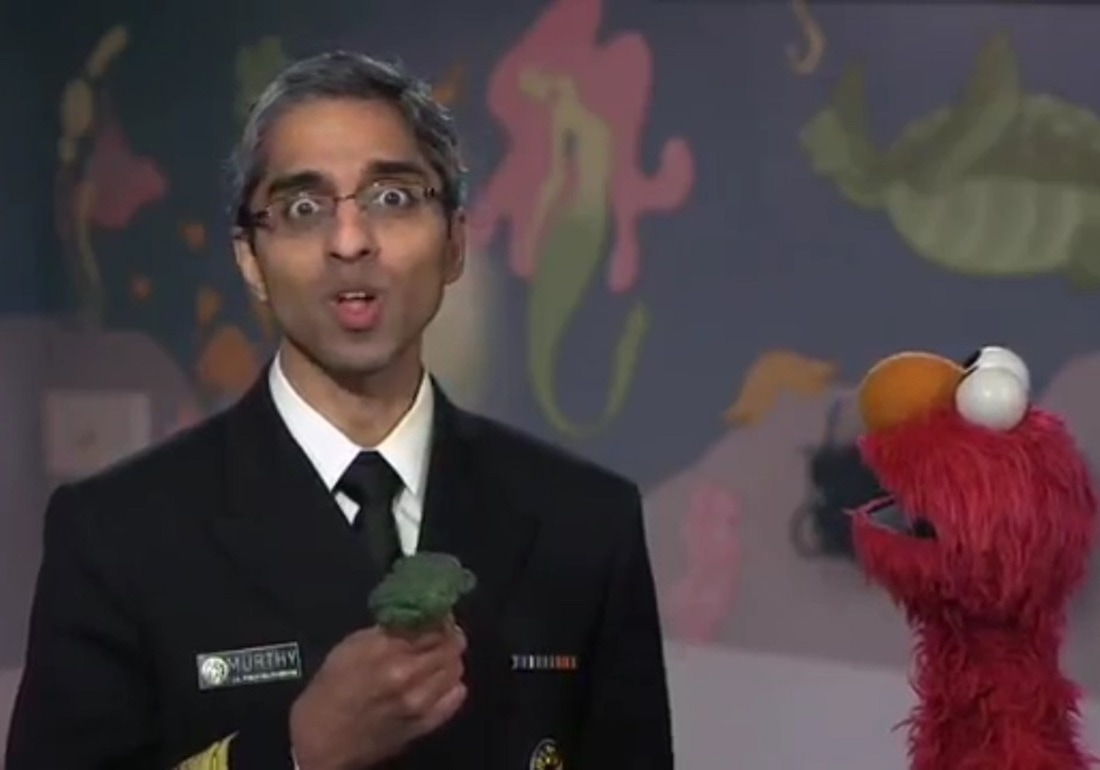The White House on Friday abruptly, and without warning, dismissed U.S. Surgeon General Vivek Murthy, a holdover from the Obama administration.
“Today, Dr. Murthy, the leader of the U.S. Public Health Service Commissioned Corps, was asked to resign from his duties as Surgeon General after assisting in a smooth transition into the new Trump Administration,” the Department of Health and Human Services said in a statement, according to USA Today.
The US public has been forced to sit by over the recent years as Murthy shilled for Big Pharma to target children. To kick off National Infant Immunization Week in 2015, Murthy teamed up with Sesame Street and Elmo for behavior placement directed at your children. The campaign sought to convince the real decision makers when it comes to childhood and infant vaccination; the children and infants. Having undertones of plain creepiness throughout the advertisement, the Surgeon General implied to your children and Elmo that their bodies can fight germs only with the help of vaccines.
Putting aside the 'safe and effective' settled-science, the reality of the campaign is that vaccines are a private company’s medical product. This is essentially a drug advertisement aimed directly at children and by doing so, violates the Federal Trade Commission’s Statutory Authority, the FDA Consumer-Directed Broadcasting Industry Guidelines, The Children’s Advertising Review Unit Guidelines, and plain moral and ethical integrity across the board. In the United Kingdom, Greece, Denmark, and Belgium, advertising to children is restricted. Children are now considered “brand touch points” for pharmaceutical industry advertising. In Quebec, Sweden and Norway, advertising to children under the age of 12 is illegal. In addition Australia, Canada, and Sweden have already adopted regulations prohibiting advertising on programs targeting audiences of young children.
The pharmaceutical drug sector, driven by profit at all costs, has a rich history of damage to public health throughout the world. GlaxoSmithKline paid out $63 million to vaccine damaged children in the UK bringing their total legal payouts for damages and fraud to over $9 billion since 2003. Furthermore, the vaccines being fraudulently advertised by Elmo and the Surgeon General required the legally binding statements on their inserts and television campaigns to include:
Here are the current regulations, guidelines, and laws regarding direct-to-consumer drug, medical, and biological advertising.
The Federal Trade Commission’s STATUTORY AUTHORITY
The Commission’s basic authority to regulate advertising and marketing practices derives from Section 5 of the FTC Act, which broadly prohibits unfair or deceptive acts or practices in commerce. The Commission “will find deception if there is a representation, omission or practice that is likely to mislead the consumer acting reasonably in the circumstances, to the consumer’s detriment.” The elements to this analysis are:
(1) the representation, omission, or practice must be likely to mislead the consumer
(2) the act or practice must be considered from the perspective of the reasonable consumer
(3) the representation, omission, or practice must be material, that is, likely to affect a consumer’s choice or conduct, thereby leading to injury
(4) When a representation or sales practice is targeted to a specific audience, such as children, the Commission will determine the effect on a reasonable member of that group.
(5) Thus, advertisements directed to children are considered from the standpoint of an ordinary child.
The U.S. Food and Drug Administration
“…in connection with consumer-directed broadcast advertisements for prescription drug and biological products. The approach presumes that such advertisements:
Children's Advertising Review Unit (CARU)
CARU's Self-Regulatory Guidelines are deliberately subjective, going beyond the issues of truthfulness and accuracy to take into account the uniquely impressionable and vulnerable child audience.
The Guidelines are based upon the following core principles:
“Today, Dr. Murthy, the leader of the U.S. Public Health Service Commissioned Corps, was asked to resign from his duties as Surgeon General after assisting in a smooth transition into the new Trump Administration,” the Department of Health and Human Services said in a statement, according to USA Today.
The US public has been forced to sit by over the recent years as Murthy shilled for Big Pharma to target children. To kick off National Infant Immunization Week in 2015, Murthy teamed up with Sesame Street and Elmo for behavior placement directed at your children. The campaign sought to convince the real decision makers when it comes to childhood and infant vaccination; the children and infants. Having undertones of plain creepiness throughout the advertisement, the Surgeon General implied to your children and Elmo that their bodies can fight germs only with the help of vaccines.
Putting aside the 'safe and effective' settled-science, the reality of the campaign is that vaccines are a private company’s medical product. This is essentially a drug advertisement aimed directly at children and by doing so, violates the Federal Trade Commission’s Statutory Authority, the FDA Consumer-Directed Broadcasting Industry Guidelines, The Children’s Advertising Review Unit Guidelines, and plain moral and ethical integrity across the board. In the United Kingdom, Greece, Denmark, and Belgium, advertising to children is restricted. Children are now considered “brand touch points” for pharmaceutical industry advertising. In Quebec, Sweden and Norway, advertising to children under the age of 12 is illegal. In addition Australia, Canada, and Sweden have already adopted regulations prohibiting advertising on programs targeting audiences of young children.
The pharmaceutical drug sector, driven by profit at all costs, has a rich history of damage to public health throughout the world. GlaxoSmithKline paid out $63 million to vaccine damaged children in the UK bringing their total legal payouts for damages and fraud to over $9 billion since 2003. Furthermore, the vaccines being fraudulently advertised by Elmo and the Surgeon General required the legally binding statements on their inserts and television campaigns to include:
- “Safety and effectiveness in pediatric patients have not been established”
- “has not been evaluated for carcinogenic or mutagenic potential, or for impairment of fertility”
- “Safety and effectiveness of measles vaccine in infants below the age of 6 months have not been established. Safety and effectiveness of mumps and rubella vaccine in infants less than 12 months of age have not been established.”
Here are the current regulations, guidelines, and laws regarding direct-to-consumer drug, medical, and biological advertising.
The Federal Trade Commission’s STATUTORY AUTHORITY
The Commission’s basic authority to regulate advertising and marketing practices derives from Section 5 of the FTC Act, which broadly prohibits unfair or deceptive acts or practices in commerce. The Commission “will find deception if there is a representation, omission or practice that is likely to mislead the consumer acting reasonably in the circumstances, to the consumer’s detriment.” The elements to this analysis are:
(1) the representation, omission, or practice must be likely to mislead the consumer
(2) the act or practice must be considered from the perspective of the reasonable consumer
(3) the representation, omission, or practice must be material, that is, likely to affect a consumer’s choice or conduct, thereby leading to injury
(4) When a representation or sales practice is targeted to a specific audience, such as children, the Commission will determine the effect on a reasonable member of that group.
(5) Thus, advertisements directed to children are considered from the standpoint of an ordinary child.
The U.S. Food and Drug Administration
“…in connection with consumer-directed broadcast advertisements for prescription drug and biological products. The approach presumes that such advertisements:
- Are not false or misleading in any respect
- Present a fair balance between information about effectiveness and information about risk
- Include a thorough major statement conveying all of the product's most important risk information in consumer-friendly language
- Communicate all information relevant to the product's indication (including limitations to use) in consumer-friendly language.
Children's Advertising Review Unit (CARU)
CARU's Self-Regulatory Guidelines are deliberately subjective, going beyond the issues of truthfulness and accuracy to take into account the uniquely impressionable and vulnerable child audience.
The Guidelines are based upon the following core principles:
- Advertisers have special responsibilities when advertising to children or collecting data from children online. They should take into account the limited knowledge, experience, sophistication and maturity of the audience to which the message is directed. They should recognize that younger children have a limited capacity to evaluate the credibility of information, may not understand the persuasive intent of advertising, and may not even understand that they are being subject to advertising.
- Advertising should be neither deceptive nor unfair, as these terms are applied under the Federal Trade Commission Act, to the children to whom it is directed.
- Advertisers should have adequate substantiation for objective advertising claims, as those claims are reasonably interpreted by the children to whom they are directed.
- Advertising should not stimulate children’s unreasonable expectations about product quality or performance.
- Products and content inappropriate for children should not be advertised directly to them.
- Advertisers should avoid social stereotyping.







 RSS Feed
RSS Feed